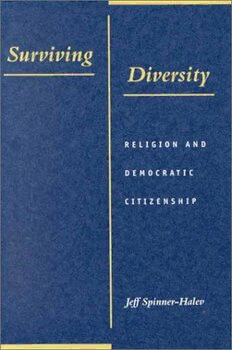
Surviving Diversity: Religion and Democratic Citizenship PDF
261 Pages·2000·10.668 MB·English
Most books are stored in the elastic cloud where traffic is expensive. For this reason, we have a limit on daily download.
Preview Surviving Diversity: Religion and Democratic Citizenship
Description:
While liberal advocates of multiculturalism frequently call for tolerance of those with diverse views, this tolerance is often not extended to members of religious groups. This lack is perhaps not surprising, since the liberal ideals of autonomy, equality, and inclusiveness are the very ones that many religious groups—particularly the more conservative ones—reject. Yet, as Jeff Spinner-Halev argues in Surviving Diversity, any theory of multiculturalism that fails to take religious groups into account is incomplete.Spinner-Halev proposes three principles on which accommodation of exclusive religious groups should be based. First, they must provide their children with a basic education and allow adults to leave the community if they wish. Second, with some exceptions they should be welcomed to participate in the public sphere, since such participation often bolsters citizenship. Third, they should be free to exclude others from their institutions, except when doing so substantially harms the citizenship of others. While not condoning such extremist groups as the Branch Davidians or the Christian Identity movement, Spinner-Halev stresses that most religious conservatives have chosen to live a life that, in a permissive Western democracy, requires considerable restraint and thought. He concludes by demonstrating how the ideals of multiculturalism can be extended to such citizens, creating a society tolerant of even greater diversity.
See more
The list of books you might like
Most books are stored in the elastic cloud where traffic is expensive. For this reason, we have a limit on daily download.
